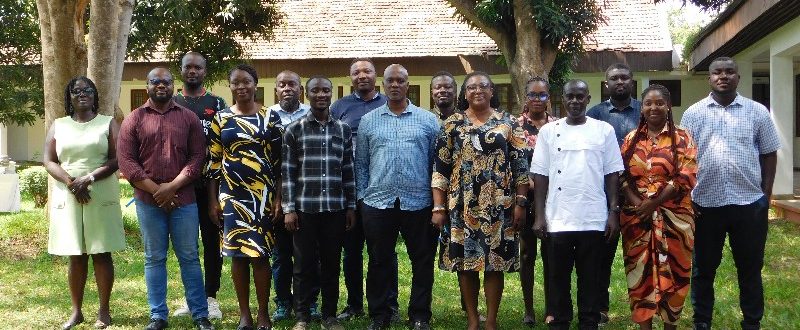The Densu Delta wetland in Accra is under threat from urbanization. The Centre for Biodiversity Conservation Research (CBCR) at the University of Ghana is working to protect this important Ramsar site.
A wetland educational center will be built to serve as a hub for community engagement, research, advocacy, aspart of conservation efforts. The Densu Delta is one of five coastal Ramsar sites in Ghana and is crucial habitat for biodiversity and an important source of livelihoods for surrounding communities. There is the need for concerted to halt the degradation and improve the ecology of this important ecosystem.
Wetland Status in Ghana
Thomas Acquah from the Wildlife division of the Forestry Commission gave an overview of the status of Ghana’s wetlands. He highlighted the challenges facing these wetlands and measures taken by the Division to address these challenges and conserve them. Human settlement and development in the core zone are the primary issues affecting wetlands, although the situation is better in some wetlands than others. He briefly discussed the activities and conservation status of the six major Ramsar sites in Ghana:
1. Owabi Ramsar Site (Kumasi) – well-conserved with support from local chiefs.
2. Keta Ramsar Site (Keta)
3. Songor Ramsar Site (Man and Biosphere Reserve)
4. Densu Delta Ramsar Site (Weija)
5. Sakumo Ramsar Site (Sakumonor)
6. Muni-Pomadze Ramsar Site (Winneba)
Stakeholder Recommendations
To protect the wetlands, we should collaborate with security agencies for enforcement and educate community leaders and members. Additionally Intensive awareness campaigns and increased education about the importance of wetlands are also necessary. This will help raise awareness and promote conservation efforts.
Kwame Owusu Asante from NADMO highlighted the future challenges in conserving wetlands. To address these challenges, it was suggested that:
Chiefs and community members should be educated about the dangers of encroaching on wetlands.
The importance of conserving wetlands should be emphasized, and communities should be informed about flood-prone areas to prevent disasters.
Mr. Thomas Acquah from the Forestry Commission and Emmanuel Ayitey an Assembly member for Bortianor are absolutely right stating that establishing an educational center in the Densu Delta Enclave will be a huge step forward in preserving nature. The center will educate people, especially community members, about the importance of Ramsar sites, moving away from the misconception that these areas are wastelands for dumping waste. By bringing the community together, the center will not only progress but also create opportunities. Emmanuel Ayitey mentioned, the educational center will boost the local economy and attract tourism. The Solo Forest, which has been a valuable resource for the community for years, will also benefit from the center, providing more educational opportunities for the community.
It’s great to see stakeholders recognizing the value of preserving these vital ecosystems. The Densu Delta Wetland, in particular, is a crucial habitat for numerous species and provides essential ecosystem services. By supporting conservation efforts and promoting sustainable livelihoods, we can ensure the long-term health of these ecosystems and the communities that depend on them.
Site Selection
The potential locations for the project are Solo Forest, Tsokomey, Aplaku, and Bortianor. Sheila Ashong from the EPA suggested excluding Solo Forest since it is outside the wetlands. However, Thomas Acquah from the Forestry Commission recommended choosing a location near, but not within, protected wetland areas, which makes Solo Forest a viable option. Raymond Owusu-Achiaw emphasized that Solo Forest is an important area near the Ramsar site and should be considered if there is limited space in the user zone..
Next Line of Activities
The next line of activities involves several key steps. Firstly, Emmanuel Taye needs to complete the ecosystem service assessment as requested by Kwame Boafo from GWS. This assessment will help identify the benefits and services provided by the wetlands, which is crucial for conservation efforts.
In addition to the assessment, efforts to raise awareness about the importance of wetlands among the media and the public need to be intensified. This can be achieved through various campaigns, workshops, and community engagement programs.
Furthermore, stakeholders have suggested developing a comprehensive wetland conservation strategy. This strategy should outline clear goals, objectives, and actions for conserving and managing the wetlands sustainably. It’s essential to have a well-planned strategy to ensure the long-term health and resilience of the wetlands

